WRITTEN & REPORTED BY FRANK PIZZOLI | Upon occupying the White House for the second time, President Donald Trump wasted no time in making good on his campaign promises, by issuing the first of what would be many anti-LGBTQ+ executive orders.
On his first day in office, January 20, 2025, Trump mandated federal agencies define sex as an exclusively male-female binary, thereby restricting use of federal facilities by transgender individuals who align with their gender identity as well as prohibiting gender self-identification on federal documents, including passports.
On January 27, the president reinstated and expanded the military ban on transgender people serving in the military. Two days later, he restricted minors’ access to gender-affirming care such as hormone therapy and surgery.
Trump’s February 3 order eliminated federal funding for K-12 schools providing education on “gender ideology,” with the measure encouraging the prosecution of teachers who facilitate a student’s social transition. On February 5, the president issued an order limiting participation in women’s sports at various levels, including schools and universities, to individuals designated female at birth. The order threatens revocation of federal funding for institutions not complying.
By July, public health was Trump’s target. He directed the Department of Health and Human Services to exclude from teen pregnancy prevention programs any queer content or risk losing federal funding. As if that wasn’t enough, the administration has rescinded Biden-era executive orders that were designed to advance queer equality by combating discrimination on the basis of gender identity or sexual orientation. Trump also directed federal agencies to terminate DEI (diversity, equity, and inclusion) programs and policies, a move widely criticized as harming queer people, people of color, and women.
Federal government websites, including those for the Centers for Disease Control and Prevention (CDC) and National Park Service, have removed content related to transgender people and gender identity in response to the president’s executive directives.
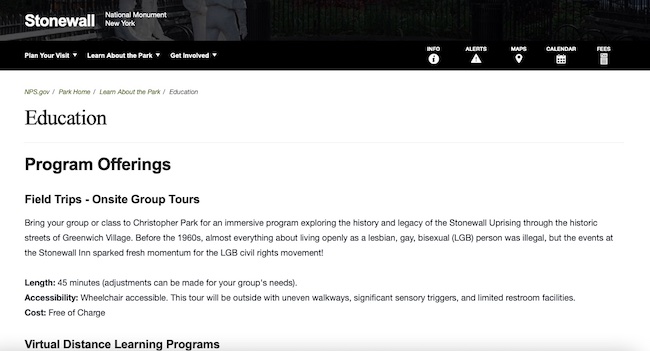
In 2019, during his first term, Trump launched the Ending the HIV Epidemic: A Plan for America initiative. In an about face, his key executive actions on HIV in 2025 include defunding prevention programs, and closing HIV-related web pages at federal health agencies like the CDC.
The sum total of these aggressive directives: The LGBTQ+ community faces an unprecedented backlash. Current threats to safety and wellness surpass what queers faced during what is known as the Lavender Scare erupting in the late 1940s and lasting until the 1960s. The scare linked homosexuality to national security threats, moral weakness, and Communism–provoking a panic in which thousands of federal employees were fired or forced to resign after President Dwight Eisenhower issued an executive order banning homosexuals from federal service. This step fueled widespread discrimination until the late 20th century, when the queer community started to chip away at historically discriminatory actions they replaced with inclusive policies.
In spite of steady gains, history shows that extinguished acts of federally sanctioned prejudice can rekindle and explode again. And that’s where the queer community is right now. Since 1969’s Stonewall Uprising, entire generations of queers grew up in the most embracing period of time, to date, for non-heterosexual individuals. Younger queers grew up with Gay and Straight Alliances (GSAs) in school and public libraries shelving books celebrating them. Those days are over, as we watch the Florida Department of Transportation remove rainbow crosswalks, and trans people are seen as threats to national security.
Are we at a loss to fight back? Is our community’s original posture of silent no more morphing into silent once again? How can we defeat the paralysis put upon us by the current administration?
By talking to, and reading about, those before us who created the political, cultural, and social milieu in which GSAs, libraries with books on queer life, and DEI could flourish.
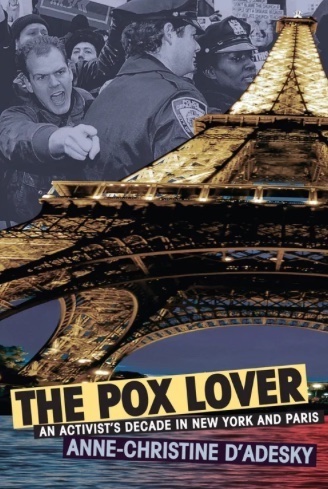
Anne-christine d’Adesky is a longtime journalist and writer and author of four books, including The Pox Lover: An Activist’s Decade in New York and Paris, her diary covering her years of living and working in both cities in the 1990s. She inventories the many lives she has lived while fighting vociferously for social justice issues. She has long been an activist–starting with anti-nuclear and feminist protests in the 80s, ACT UP from its first days, a cofounder of the 90s Lesbian Avengers, and, more recently, the Bay Area Queer Anti-Fascist Network during Trump 1.0, and, in 2023, the national Stop The Coup 2025 campaign to stop Project 2025, now morphed into Resisting Project 2025 with a focus on tracking resistance to Trump 2.0.
Describing the current state of LGBTQIA+ political activities and the ongoing Trump Administration threats to our established freedoms, d’Adesky said, “We have to distinguish the broad response of LGBTQIA+ individuals and community groups, versus the larger advocacy and legal groups who are viewed as representing the LGBTQIA+ political movement.” One is not the other.
“The fact is, we have a large, broad, multilayered LGBTQIA+ movement and we have many talented leaders, but we are not a nationally organized movement, nor a political party. If anything, LGBTQIA+ activist groups have smartly learned to work intersectionally. So we have to be clear about our expectations,” d’Adesky explained.
She characterizes the situation as involving a “large, quite fractured progressive movements–plural–in the US, who are not certain about how to advance, and what can move the needle, concretely, strategically, beyond mobilization, which is happening. We need tactics, and to share what can work.”
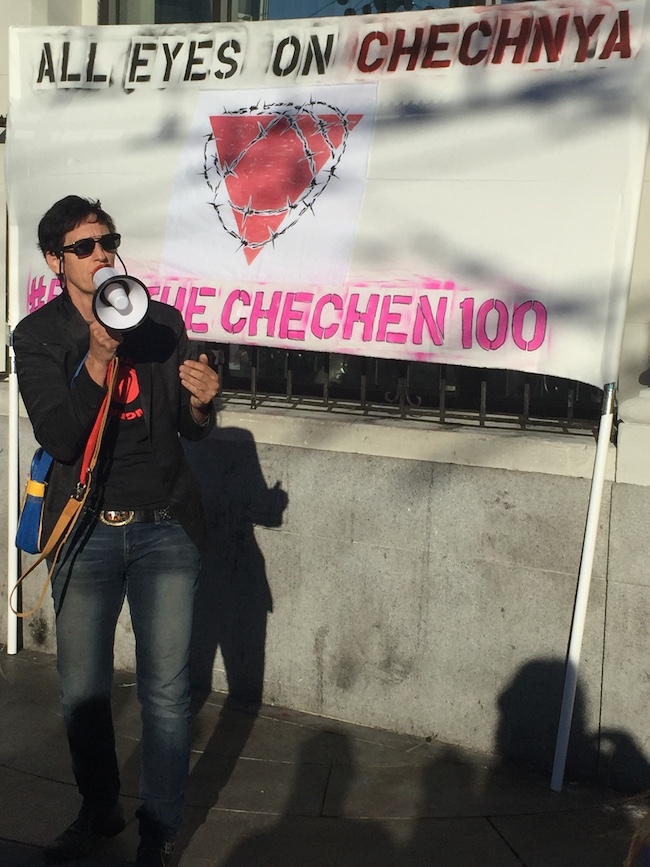
The Trump directives “are deliberate attacks on so many fronts at once,” says d’Adesky, noting, “It’s designed to overwhelm and make it hard to decide which attack to respond to and how.” Never having faced a threat like Trump, “We’re in a learning curve.” Unfortunately, Project 2025 gave the radical right a useful attack plan “and while many of us did our all to mobilize America to be aware and prepared to fight back, too many pinned their hopes on the election. So now we are in major catch-up mode and being hammered.”
There’s a positive side for d’Adesky, who’s focusing on solutions and sees hope.
“LGBTQIA+ activists are, as we have been for decades, at the forefront of the active street resistance to the authoritarianism we are seeing from Trump’s second administration,” d’Adesky says. She points to the formation of national coalitions and groups that include 50501, The Women’s March, Indivisible, and established activist coalitions such as Health GAP, fighting against the devastating cuts to public health and HIV funding and key agencies at home and abroad.
“Transgender leaders have been among the most vocal at all levels, too. That’s been heartening to witness,” d’Adesky notes. Public mobilization is a first step; countering Trump’s propaganda and lies is another. The new coalitions, d’Adesky thinks, need to build common cause against a few targets that represent issues that impact the broadest number of Americans, such as economics, and make visible how Trump’s policies are hurting them. Seizing control of the narrative is critical.
Among national groups, d’Adesky observes, “We’ve seen concrete organized resistance by the legal and immigration rights groups–including Lambda Legal–who have joined the ACLU and allies in Democracy Forward to mount effective legal challenges to anti-LGBTQ+ executive orders such as those stripping transgender soldiers of the right to serve, and now, their hard-earned benefits.”
A recent Just Security report provides evidence of the victories: Out of 348 cases filed against the Trump administration through August 28, 130 have led to blocking the president’s orders, and 148 other cases await a ruling. Some apply a permanent brake, and demand restoration of eliminated policies and programs or funding, others are temporary. “A number are cases being appealed that are headed to the Supreme Court. But they make clear that our judiciary is still working–albeit under severe pressure by Trump’s attacks against federal judges, too,” d’Adesky said.
Queer military service groups are also vocal and organized, d’Adesky notes, as the “push to provide legal and other guidance to affected trans and other service members, and also to join legal challenges.” She says some agencies are better poised than others to fight back using the law. “But nationally, the responses of established LGTBQIA+ groups have not been as effective, organized, or strategic enough when it comes to our broad need for critical national conversations and gatherings about needed responses to specific attacks.”
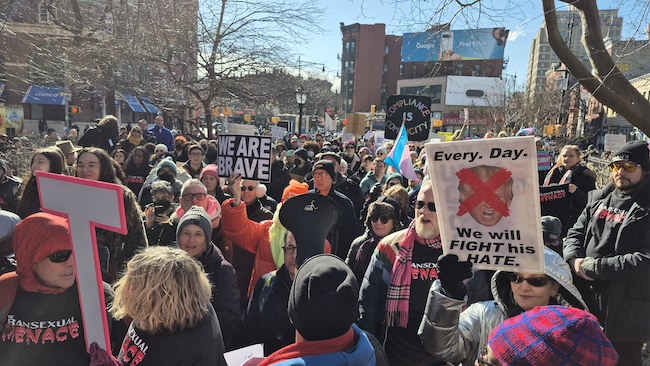
On the national level, she said, “Groups are working in siloed ways, with the groups they are used to working with, and in sectoral ways. For example, national and state HIV groups meet to talk about how to cope with the funding attacks, and the national and state HIV funders must join those calls,” she explains. The groups working on Medicaid meet and strategize. “So people are doing this work, but it’s too siloed,” d’Adesky asserts, “and the conversations aren’t getting elevated to reach more people, including new activists to join resistance groups. There are advantages to siloed work: It can be specific, and solutions to challenges can surface. But it’s not breaking through.”
On the national LGBTQIA+ scene, d’Adesky feels “the strategic leadership is acutely missing, but that’s not a new issue, either; it just hurts us because we need that right now. What we need most urgently right now is a sharing of what tactics might work to fight back.”
Using marriage equality as an example, d’Adesky said, “We have a longtime right wing homophobic activist, Kim Davis, who has petitioned the Supreme Court in a case seeking to reverse marriage equality, a long-sought goal of the conservative movement.” Davis’s legal arguments are thin “and she has lost her arguments in lower courts, so LGBTQIA+ legal scholars are saying they are cautiously hopeful the Supreme Court will reject her appeal and pass on taking up the case.” But d’Adesky cautions we cannot count on that happening, noting, “On the other hand, we’ve already seen the conservative majority on the highest court overturn ‘settled law’–look at Roe v. Wade–and it’s a stated goal of Project 2025 and the Christian conservative movement to eliminate our rights. So we should expect the conservatives could, and may, reverse marriage equality.”
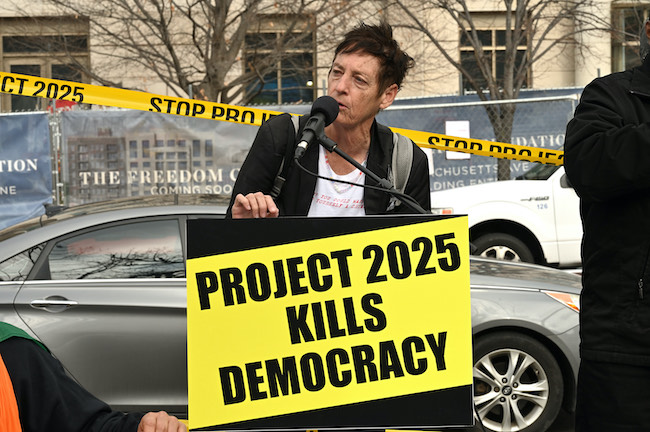
We should act as if they will try and be mobilized with a strategy, d’Adesky advises, calling for the rallying of LGBTAIA+ champions at the state level and nationally. “Gay people who are married, and their families and children, are right to be afraid,” she says, while advising we “turn that fear into focused activism. We need that proactive leadership in the streets, and at policy levels. We can’t be waiting to lose more rights.”
What steps and strategies would d’Adesky like queer individuals to play as the threats to our freedoms mount?
Topping the list are two things to be done in tandem. She recommends:
1: “Be aware that we have the MOST freedoms we may have, right now, including the freedom to organize and speak out and organize resistance actions and we need to do that. Silence is neither safety nor a smart move. We also need to elevate the voices of those most impacted and focus on mutual aid for the most vulnerable. We have to speak out while we can.”
2: “At the same time, we must fight our human impulse to play down the threats. We must assume things may get worse, and faster than we expect, because the administration has made clear its agenda. We need to act like Trump’s policies are a hurricane and we need to do emergency disaster prep and organize our go bags. We must respond in emergency mode.” d’Adesky recommends this, “having studied what lessons LGBTQIA+ groups in Russia and elsewhere have learned and are sharing with us.”
More urgently, d’Adesky issues her activist Wish List for right now:
“We urgently need a series of online and in-person activist community Town Hall meetings and strategic conversations that bring together LGTBQIA+ leaders across sectors. These could be organized by topic and key groups organizing national marches.”
D’Adesky cites one lesson learned from other countries: “We need to present the attacks on LGBTQIA+ rights as part of the broader anti-democratic agenda. We need to counter the ‘special rights’ argument of the right, and its attempt to divide and isolate our demands as threats to the rest of society. LGBTQIA+ rights must be discussed and championed as a key principle of the broad pro-democracy movement. That is what activists outside the US have done to broaden their movement, in Brazil against Bolsonaro, for example, and now, in Argentina against Milei. We can’t be siloed in our demands. LGBTQIA+ rights are part of America’s commitment to equality.”
She calls for a national summit later this year for frontline activists. Her wish list would include “a Fall DC 3-day Emergency National Conference” to help key actors in the LGBTQIA+ and broader resistance hear from each other, strategize, and bring these insights and tactics back to state and local groups. “And make that meeting visible and accessible with streaming sessions, so many more can participate. Can it be organized? Sure. Would some national group fund it and do this? They could, they should. Let’s ask them. Let’s bring the journalists together. From there, solutions, approaches, tactics, new ideas emerge.”
—END—
Note: Recently launched by d’Adesky, What Works to Stop a Dictator is a global field reporting series focused on lessons for America. Click here to access it.
ABOUT FRANK PIZZOLI | Pizzoli’s essays, book reviews, profiles, and reviews have been published nationwide. He founded the award-winning LGBTQ newspaper The Central Voice (2003-2020) and Positive Opportunities, Inc. (1997-2017), a nonprofit that provided employment counseling and training for HIV-positive individuals. His work is chronicled in Out in Central Pennsylvania: The History of an LGBTQ Community (Penn State University Press). Pizzoli’s latest book, Passionate Outlier: Gay Writers and Allies on Their Work, is available from Rebel Satori Press.
LGBTQCommunityNews.nyc is an independent, free source of queer-centric news, arts, info, and opinion content. Our website, podcast, and quarterly newspaper are funded by advertising revenue and reader donations. To support this project, click here for the GoFundMe campaign. Questions? Comments? Click here to contact us. To join the subscriber list of our free ENewsletter, click here.









